
Herbert Hill
Encyclopedia

National Association for the Advancement of Colored People
The National Association for the Advancement of Colored People, usually abbreviated as NAACP, is an African-American civil rights organization in the United States, formed in 1909. Its mission is "to ensure the political, educational, social, and economic equality of rights of all persons and to...
for decades and was a frequent contributor to New Politics (magazine)
New Politics (magazine)
New Politics is an independent socialist journal founded in 1961 and still published in the United States today. While it is inclusive of articles from a variety of left-of-center positions, the publication leans strongly toward a Third camp, democratic Marxist perspective, placing it typically to...
as well as the author of several books. He was later Evjue-Bascom Professor of Afro-American Studies and Industrial Relations at the University of Wisconsin–Madison
University of Wisconsin–Madison
The University of Wisconsin–Madison is a public research university located in Madison, Wisconsin, United States. Founded in 1848, UW–Madison is the flagship campus of the University of Wisconsin System. It became a land-grant institution in 1866...
and eventually emeritus professor. He played a significant role in the civil rights movement in pressuring labor unions to desegregate and to seriously implement measures that would integrate African Americans in the labor market. He was also famous for his belief that American trade unions had downplayed the history of racism that tarred their reputations, before and after the Jim Crow
Jim Crow laws
The Jim Crow laws were state and local laws in the United States enacted between 1876 and 1965. They mandated de jure racial segregation in all public facilities, with a supposedly "separate but equal" status for black Americans...
era.
Biography
Hill earned a B.A. from New York UniversityNew York University
New York University is a private, nonsectarian research university based in New York City. NYU's main campus is situated in the Greenwich Village section of Manhattan...
in 1945 and attended the New School for Social Research from 1946 until 1948 where he studied under the distinguished political theorist, Hannah Arendt
Hannah Arendt
Hannah Arendt was a German American political theorist. She has often been described as a philosopher, although she refused that label on the grounds that philosophy is concerned with "man in the singular." She described herself instead as a political theorist because her work centers on the fact...
. During the 1940s, Hill was a member of the Socialist Workers Party
Socialist Workers Party (United States)
The Socialist Workers Party is a far-left political organization in the United States. The group places a priority on "solidarity work" to aid strikes and is strongly supportive of Cuba...
. Hill (although white) was appointed Labor Director of the NAACP in 1951 where he worked until 1977 when he departed for a professorship at the University of Wisconsin–Madison
University of Wisconsin–Madison
The University of Wisconsin–Madison is a public research university located in Madison, Wisconsin, United States. Founded in 1848, UW–Madison is the flagship campus of the University of Wisconsin System. It became a land-grant institution in 1866...
. He was highly critical of the practice of nepotism in many unions whereby relatives of members were hired. Hill criticized labour relations practises in numerous industries including the film industry as well as the progress of the Kennedy Administration on issues of racial equality in the workplace. Among the many unions he criticized for their record on racial equality were the International Ladies Garment Workers Union, the United Auto Workers
United Auto Workers
The International Union, United Automobile, Aerospace and Agricultural Implement Workers of America, better known as the United Auto Workers , is a labor union which represents workers in the United States and Puerto Rico, and formerly in Canada. Founded as part of the Congress of Industrial...
, the United Federation of Teachers
United Federation of Teachers
The United Federation of Teachers is the labor union that represents most educators in New York City public schools. , there were about 118,000 in-service educators and 17,000 paraprofessionals in the union, as well as about 54,000 retired members...
and the United Steelworkers of America as well as the AFL-CIO
AFL-CIO
The American Federation of Labor and Congress of Industrial Organizations, commonly AFL–CIO, is a national trade union center, the largest federation of unions in the United States, made up of 56 national and international unions, together representing more than 11 million workers...
federation itself. Hill particularly objected to the AFL-CIO
AFL-CIO
The American Federation of Labor and Congress of Industrial Organizations, commonly AFL–CIO, is a national trade union center, the largest federation of unions in the United States, made up of 56 national and international unions, together representing more than 11 million workers...
position that Title VII of the 1964 Civil Rights Act should not interfere with existing seniority systems. He was also a strong supporter of affirmative action
Affirmative action
Affirmative action refers to policies that take factors including "race, color, religion, gender, sexual orientation or national origin" into consideration in order to benefit an underrepresented group, usually as a means to counter the effects of a history of discrimination.-Origins:The term...
. According to a New Politics
New Politics (magazine)
New Politics is an independent socialist journal founded in 1961 and still published in the United States today. While it is inclusive of articles from a variety of left-of-center positions, the publication leans strongly toward a Third camp, democratic Marxist perspective, placing it typically to...
article by Stephen Steinberg, Supreme Court Justice Thurgood Marshall
Thurgood Marshall
Thurgood Marshall was an Associate Justice of the United States Supreme Court, serving from October 1967 until October 1991...
once described Hill as "the best barbershop lawyer in the United States".
He also organized pickets to raise awareness of racial discrimination in the construction industry. His conduct was so controversial that some unions threatened to withhold funding of the NAACP unless Hill was fired, but the NAACP leadership under Roy Wilkins
Roy Wilkins
Roy Wilkins was a prominent civil rights activist in the United States from the 1930s to the 1970s. Wilkins' most notable role was in his leadership of the National Association for the Advancement of Colored People ....
supported Hill. Hill published over one hundred articles in journals, anthologies and newspapers and was also known for debates with labor historian Herbert Gutman
Herbert Gutman
Herbert Gutman was an American professor of history at the Graduate Center of the City University of New York, where he wrote on slavery and labor history.-Early life and education:...
as well as debates in New Politics (magazine)
New Politics (magazine)
New Politics is an independent socialist journal founded in 1961 and still published in the United States today. While it is inclusive of articles from a variety of left-of-center positions, the publication leans strongly toward a Third camp, democratic Marxist perspective, placing it typically to...
with union leader Al Shanker and Nelson Lichtenstein
Nelson Lichtenstein
Nelson Lichtenstein is a professor of history at the University of California, Santa Barbara, and director of the Center for the Study of Work, Labor and Democracy...
, an academic and biographer of Walter Reuther
Walter Reuther
Walter Philip Reuther was an American labor union leader, who made the United Automobile Workers a major force not only in the auto industry but also in the Democratic Party in the mid 20th century...
. Hill was especially sharp against Lichtenstein's support for the allegedly racist Reuther and the UAW's activities to betray the civil rights movement. He also served as a consultant for the Equal Employment Opportunity Commission
Equal Employment Opportunity Commission
The U.S. Equal Employment Opportunity Commission is an independent federal law enforcement agency that enforces laws against workplace discrimination. The EEOC investigates discrimination complaints based on an individual's race, color, national origin, religion, sex, age, perceived intelligence,...
and the United Nations
United Nations
The United Nations is an international organization whose stated aims are facilitating cooperation in international law, international security, economic development, social progress, human rights, and achievement of world peace...
.
ILGWU Campaign
One of the most important campaigns led by Hill was his campaign against the discriminatory practices of the ILGWU. Despite the fact that the ILGWU had cooperated with the NAACP with respect to desegregation of union locals in the South, as late as the early 1960s, there were still no African-American nor Puerto Rican officers or executive board members in the ILGWU in its New York CityNew York City
New York is the most populous city in the United States and the center of the New York Metropolitan Area, one of the most populous metropolitan areas in the world. New York exerts a significant impact upon global commerce, finance, media, art, fashion, research, technology, education, and...
base. The ILGWU was of particular importance because of its major role in the Liberal Party of New York
Liberal Party of New York
The Liberal Party of New York is a minor American political party that has been active only in the state of New York. Its platform supports a standard set of social liberal policies: it supports right to abortion, increased spending on education, and universal health care.As of 2007, the Liberal...
. Hill played a key role in taking on a complaint against Local 10 of the ILGWU of an African American cutter, Ernest Holmes, who had been repeatedly prevented from joining the cutters' union, thereby receiving lower wages and denied the health and welfare benefits associated with union membership. Hill alleged that the ILGWU restricted African American and Puerto Rican workers to low paying jobs. In 1962, the New York State Commission for Human Rights found that Local 10 had violated the state antidiscrimination law. The ILGWU launched a public relations campaign alleging partisanship on the part of the Republican appointed Commission in response and did little to solve the problem. Writing in New Politics (magazine)
New Politics (magazine)
New Politics is an independent socialist journal founded in 1961 and still published in the United States today. While it is inclusive of articles from a variety of left-of-center positions, the publication leans strongly toward a Third camp, democratic Marxist perspective, placing it typically to...
, a leading ILGWU official, Gus Taylor, attempted to show that there were African Americans and Puerto Ricans in the union. Adam Clayton Powell Jr. held Congressional hearings in the House Committee on Education and Labor on the ILGWU practices in 1962. Hill testified at the hearings, criticizing David Dubinsky
David Dubinsky
David Dubinsky was an American labor leader...
for his governance of the ILGWU. Even though Hill was Jewish, allegations of anti-semitism
Anti-Semitism
Antisemitism is suspicion of, hatred toward, or discrimination against Jews for reasons connected to their Jewish heritage. According to a 2005 U.S...
were made with respect to the NAACP critique of the ILGWU. Changes to the ILGWU only came about slowly, especially after the retirement of Dubinsky in 1966.
Works
His books include:- Anger and Beyond: The Negro Writer in the United States. Ed. Herbert Hill. New York: Harper & Row, 1966.
- The AFL-CIO and the black worker : Twenty five years after the merger. Alexandria, Virginia: National Association of Human Rights Workers, 1982.
- Black Labor and the American Legal System: Race, Work, and the Law. Madison: University of Wisconsin Press, 1985 ed.
- Race in America : The struggle for equality. Eds. Herbert Hill & James E. Jones Jr. Madison: University of Wisconsin Press, 1993.
- "Herbert Hill on the UAW" and Hill on the AFL and the Mob and Hill on racism and the Steelworkers at
http://www.rohan.sdsu.edu/%7Ergibson/hill.html

